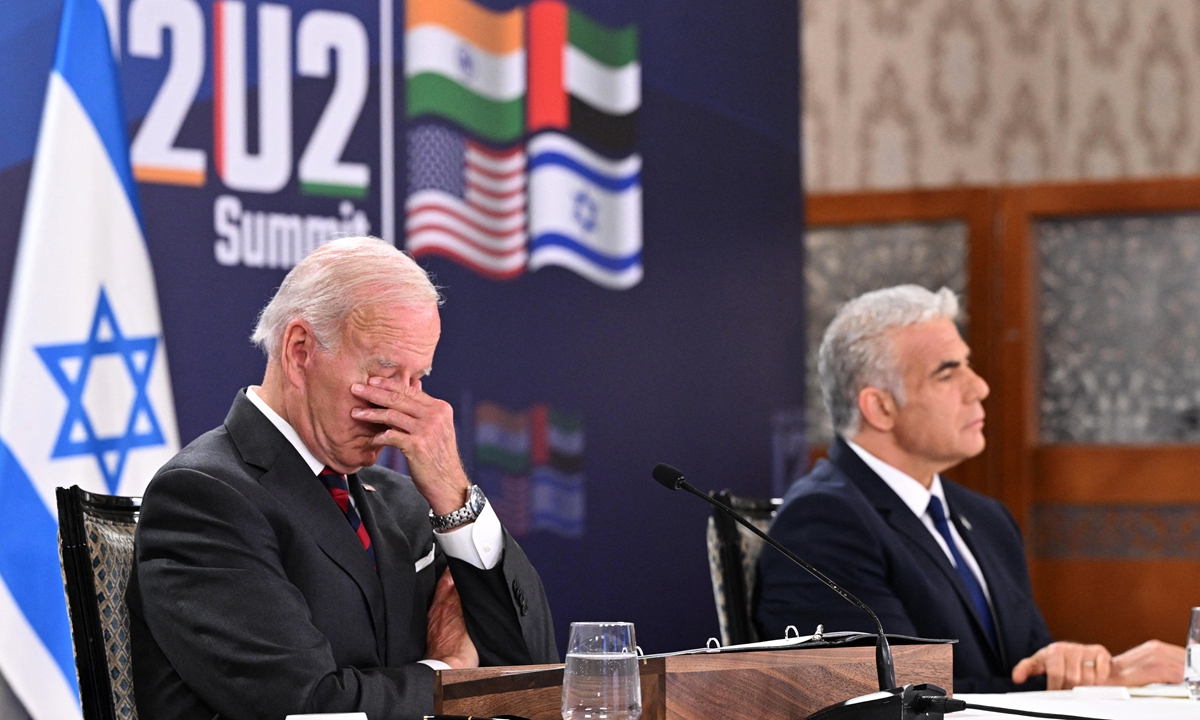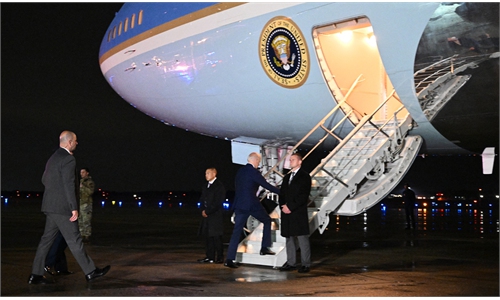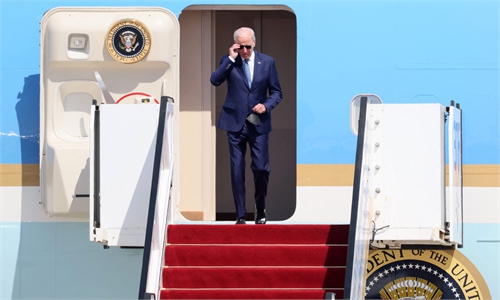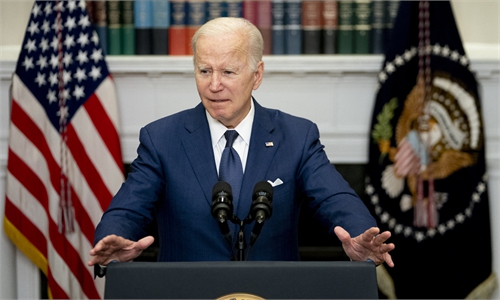Biden’s Middle East visit ‘empty- handed’ despite U-turn in stance
Hard for US to win over allies as Middle East moves to multilateralism: expert

US President Joe Biden (left) and Israel's caretaker Prime Minister Yair Lapid, take part in a virtual meeting with leaders of the I2U2 group at a hotel in Jerusalem, on July 14, 2022. Photo: AFP

Palestinians protest against US President Joe Biden's visit, in Gaza City, on July 14, 2022. Thousands of Palestinians on Thursday staged demonstrations in the West Bank and Gaza Strip against US President Joe Biden's first visit to Israel and the Palestinian territories, slamming his biased stance on the Israeli-Palestinian issue. Photo:Xinhua
US President Joe Biden concluded his four-day trip to the Middle East trying to give reassurances of Washington's influence in the region, which was riposted by Chinese observers as this trip only showed that US influence in this region is declining, since Biden returned home empty-handed after none of his major goals - pushing regional countries to contain Iran, and persuading them to increase oil supplies to slash Russia's oil income - were achieved.
Moreover, the US President's repeated peddling of the so-called threat posed by China and Russia in the Middle East made the already conflict-laden region realize the increasing danger caused by the US. Experts said that making a U-turn to cozy up to Middle East countries when the US is in an oil crisis has further exposed the US' selfishness and hypocrisy to those regional countries, while choosing the wrong time for the visit which yielded few results meant that Biden's first Middle East trip was yet another huge and awkward diplomatic blunder.
In a speech during a summit with six Gulf states, Egypt, Jordan and Iraq in Jeddah, Biden said that the US will remain an active, engaged partner in the Middle East, and Washington will not walk away and leave a vacuum to be filled by Russia, China or Iran, he said.
"The US is invested in building a positive future for the region, in partnership with all of you — and the US is not going anywhere," he said, according to a transcript of his speech.
Biden made the remarks after concluding his four-day trip to the region, his first after more than a year and a half since taking office. Israel was the first leg of his four-day trip, followed by the West Bank and Saudi Arabia.
But in the eyes of Chinese experts, Biden's Middle Eastern trip was both "fruitless" and "embarrassing," as the two major goals of his administration are to coordinate regional countries to form an effective deterrence against Iran, and to push oil supply increases from Saudi Arabia in order to slash Russia's earnings from oil, a professor from the Institute of International Relations at the China Foreign Affairs University in Beijing, who requested anonymity, told the Global Times, noting that so far, none of those goals were achieved.
According to Reuters, the summit communiqué was vague, and Saudi Arabia, Washington's important Arab ally, poured cold water on US hopes that the summit could help lay the groundwork for a regional security alliance - including Israel - to combat Iranian threats.
Saudi Crown Prince Mohammed bin Salman said on Saturday that there's also no guarantee the increase in oil production beyond current levels will happen, and that his country was nearly tapped out and could not produce more than 13 million more barrels per day, Politico reported.
After Biden repeatedly chided China and Russia before and during his trip, Saudi Minister of State for Foreign Affairs, Adel al-Jubeir, said in an interview with CNBC on Saturday that Riyadh will continue to bolster its partnerships with both Washington and Beijing. "We build bridges with people; we don't see one as exclusive of the other," said the minister.
Zhu Weilie, director of the Middle East Studies Institute at Shanghai International Studies University, pointed out that Biden's Middle Eastern trip sends alarming signs to regional countries, as they see clearly that the US is not trying to solve problems, but seeking to lead the already conflict-stricken region to greater discord.
The US will find it as hard to win over allies to contain China as it does in the Asia Pacific, said the Beijing-based expert, noting that China has no enemy country in the Middle East, only solid, mutual beneficial cooperation. "Plus, China won't preach to Middle Eastern countries what to do and what values they should adopt, and won't slap sanctions on them," he said.
In response to Biden's remarks, a spokesperson from the Chinese Embassy in Israel said on Saturday, "The Middle East is a land of its people, not anyone's backyard. There is no so-called 'vacuum' there."
"The Middle East is not yet tranquil, with COVID-19 posing a protracted challenge to regional development and the spillover of the Ukraine crisis affecting regional security. The people in the Middle East want development and security more than anything else. The international community, and major countries in particular, should make it a priority and work constructively to help the countries and people in this region realize development and security, not otherwise," according to the spokesperson.
As for Russia, Zhu said it is hard to edge Russia out of this region, not only because Russia has a strong presence there, but also because it shares strong energy ties with regional countries.
Right after Biden left, Russian President Vladimir Putin will travel to Tehran on July 19 for a Syria summit with his Iranian counterpart Ebrahim Raisi and Turkey's Recep Tayyip Erdogan, the Kremlin announced.
Putin's visit coming on the heels of Biden's trip aims to show that Russia is still welcomed in Middle East, and is not a pariah, as US officials called it, said the anonymous expert, noting that Putin's gesture also aims to show that it has maneuvered to compete with the US in this region.
Moreover, as Biden tries hard to win over Middle Eastern countries, they are edging closer to a truly multilateral framework that includes China and Russia. President of BRICS International Forum, Purnima Anand, said in an interview with the "Izvestia" newspaper that Turkey, Egypt and Saudi Arabia may join the BRICS International Forum "very soon."
Embarrassing moments
Biden's administration has already been at odds with key Middle East allies such as Saudi Arabia, the United Arab Emirates, and Egypt over a range of issues, including human rights.
Experts also pointed out that the US advocacy of human rights and its ideology are insurmountable obstacles that have caused deep-rooted suspicion and distrust between US and Middle Eastern countries, which are also growing more suspicious of Washington's "self-interest first" diplomacy.
Biden's photo with the Crown Prince of Saudi Arabia also gained widespread international media attention, as he made a U-turn from calling the country a "pariah" over human rights issues to bumping fists and posing for pictures with him. "This shows how hypocritical US diplomatic policy is. Once there are interests, they can immediately stamp on their so-called values right under their feet," said the Beijing-based expert.
When bringing up the killing of journalist Jamal Khashoggi during his meeting with Prince Mohammed, the latter, apart from confirming that "what happened is regrettable and we have taken all legal measures to prevent a recurrence," also hit back by saying that "such an incident occurs anywhere in the world", highlighting "a number of mistakes" made by Washington such as torturing detainees at Abu Ghraib prison in Iraq, Al-Arabiya reported.
Zhu said that such a swift change of attitude also shows Biden's anxiety in curbing rising US oil prices. "His [Biden's] most urgent issues are inflation and skyrocketing oil prices. For every cent that oil rises in price, the Democrats lose many votes," he said.
Back home, Biden's trip was also mocked by many US media outlets, with Washington Post describing it as a "controversial trip," and that "it remains unclear whether Biden's gambit will deliver the results he is seeking."
There were reports that Biden had been torn over whether to make this trip. "It seems like it is better he hadn't made the trip, as he returned home empty-handed, has nothing to give to the voters, and it turned out to be an embarrassing diplomatic blunder in his term," said the Beijing-based expert.






